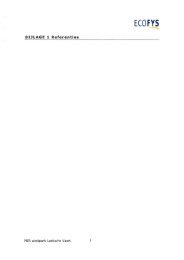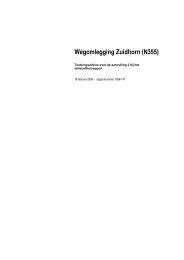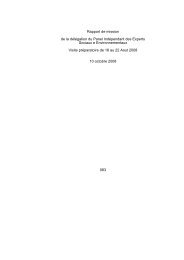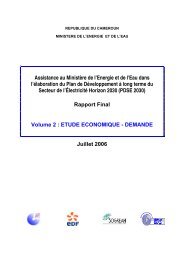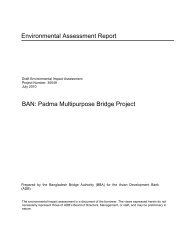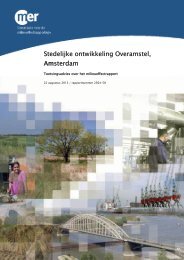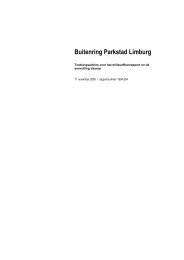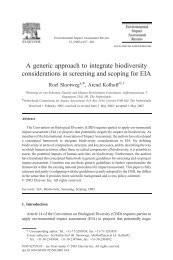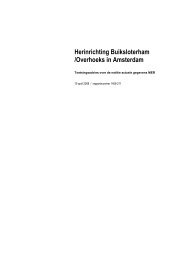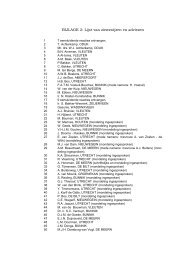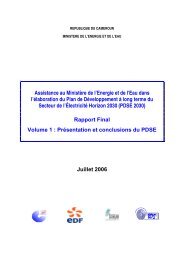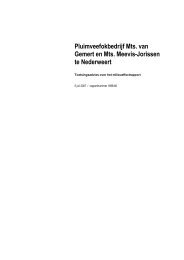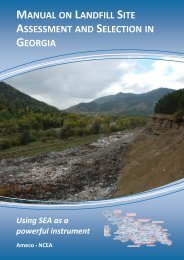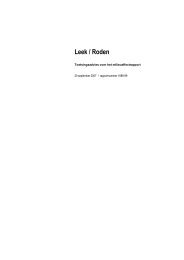3. Master plan phase : 5 months. This will include workshops with relevant stakeholders topresent and discuss <strong>the</strong> draft MPNote: <strong>the</strong> exact planning <strong>for</strong> <strong>the</strong>se last two phases remains a bit unclear. The inception report<strong>for</strong>esees “Exploratory reports workshops” by <strong>the</strong> end of March and end of April 2013, and “MasterPlan workshops” in June, September, October 2013. The RWRD also speaks of a validation processstarting in June 2013 (personal comment Head of RWRD). However, according to <strong>the</strong> consultants’inception report, <strong>the</strong> actual Master Plan will only become available in August and September 2013.This seems contradictory and needs to be clarified (see also SEA task 1 on <strong>the</strong> next page).ToR <strong>for</strong> an SEA on <strong>the</strong> Master PlanTo address some of <strong>the</strong> risks associated to <strong>the</strong> Master Plan an SEA is recommended as a tool toprovide independent in<strong>for</strong>mation to <strong>the</strong> validation and decision making process. In closecollaboration with RWRD and earliest as possible, an SEA <strong>for</strong> <strong>the</strong> Master Plan should be startedaddressing <strong>the</strong> potential consequences of choices made by <strong>the</strong> Master Plan. Focus of <strong>the</strong> SEAshould be on:- contents: quality of <strong>the</strong> in<strong>for</strong>mation base, gaps in in<strong>for</strong>mation and consequences <strong>for</strong> decisionmaking; are social and environmental sustainability addressed in an appropriate manner?- governance, i.e. <strong>the</strong> appropriateness of <strong>the</strong> institutional arrangement. in particular in relationto <strong>the</strong> required flexibility <strong>for</strong> planning at catchment level, effective linkages between <strong>the</strong> MISand planning at catchment level, representation of different sectors and levels of governmentand o<strong>the</strong>r stakeholders to ensure buy-in in <strong>IWRM</strong> processes.1. Planning & process managementAs observed above, questions remain regarding <strong>the</strong> exact timing and steps in <strong>the</strong> process ofdeveloping <strong>the</strong> Master Plan. If an inclusive process (allowing all relevant stakeholders to learn of,appreciate and share insights on <strong>the</strong> Master Plan) is not secured during <strong>the</strong> Master Plandevelopment process, risk may be that stakeholders will not understand, support and ultimately,take responsibility <strong>for</strong> elements of <strong>IWRM</strong> implementation, as laid out in <strong>the</strong> Master Plan. Thiswould render <strong>IWRM</strong> unsustainable in <strong>the</strong> longer run. In addition, <strong>the</strong> SEA itself will be less effectiveif it is not well integrated into <strong>the</strong> planning process of <strong>the</strong> Master Plan. It is <strong>the</strong>re<strong>for</strong>e important <strong>for</strong>both <strong>the</strong> SEA and <strong>the</strong> Master Plan planning process, to get clarity on <strong>the</strong> exact planning of <strong>the</strong>process.SEA task 1:a. Clarify <strong>the</strong> exact phasing of <strong>the</strong> Master Plan development process, in terms ofplanning of all steps, participating stakeholders, and objective of <strong>the</strong> steps;b. Assess <strong>the</strong> feasibility of two options <strong>for</strong> <strong>the</strong> SEA time frame:a. Ideally start pro-actively with <strong>the</strong> SEA, as soon as possible in 2013, allowingto in<strong>for</strong>m <strong>the</strong> Master Plan development process on development constraintsand opportunities;b. Alternatively, do <strong>the</strong> SEA reactively, to assess <strong>the</strong> social and environmentalconsequences of <strong>the</strong> draft Management Plan as presented <strong>for</strong> validation. Thiswould bring <strong>the</strong> scope of <strong>the</strong> SEA on <strong>the</strong> validation phase;34
c. Describe <strong>the</strong> pros and cons of each option (in terms of quality of process,quality in<strong>for</strong>mation, potential influence of SEA, feasibility in time andcapacity, etc).c. Decide on way <strong>for</strong>ward. Note that international best practice would suggest pro-activeSEA as it allows <strong>for</strong> better integration in <strong>the</strong> Master Plan development process. That iswhat <strong>the</strong> NCEA would recommend. The re-active option would however still be a ‘ SEAproof’ alternative;d. Suggest proper alignment of SEA steps as identified in <strong>the</strong> next pages to that way<strong>for</strong>ward. Note that NCEA would be available to advise if so required2. Reliability and representativeness of dataThe master plan process is comprehensive and will generate a significant amount of relevantin<strong>for</strong>mation. Given major gaps in available in<strong>for</strong>mation, <strong>the</strong> water supply and demand data,including <strong>the</strong> water balances at (sub)catchment level will be indicative only. They will be sufficientto provide an overview of potential development opportunities and constraints, but will not haveenough reliability <strong>for</strong> detailed planning of interventions at catchment level. For catchmentplanning more refined in<strong>for</strong>mation may be needed. This is acknowledged by <strong>the</strong> consultantdrafting <strong>the</strong> Master Plan. An MIS is being developed <strong>for</strong> data collection, management andassessment purposes.SEA task 2:a. Assess <strong>the</strong> quality and reliability of <strong>the</strong> availability of water data. Indicate where a cautiousapproach in <strong>the</strong> use of <strong>the</strong> available data is necessary;b. Assess <strong>the</strong> quality and reliability of water supply and demand per catchment;c. From a catchment planning and management perspective, identify gaps in in<strong>for</strong>mationand define additional data collection or verification needs <strong>for</strong> realistic catchment planningpurposes. Note: <strong>the</strong>se needs may differ per catchment!;d. Assess validity of MIS and appropriateness <strong>for</strong> WRM monitoring and managementpurposes at catchment level. Assess which measures are proposed (and underimplementation) <strong>for</strong> improvement. Provide recommendations on how to deal with gaps inknowledge or methodological challenges.3. Master Plan methodological issuesThe master plan is based on <strong>the</strong> identification of water users, roughly divided into consumptiveusers (taking water) and in-stream uses (example: fisheries & navigation). Environment is in thisview considered as a water user requiring a minimal flow. This approach runs <strong>the</strong> risk ofoverlooking important water related environmental services on which people depend. Especiallyregulatory services such as flood buffering, surface water storage, sediment removal, and waterpurification service will be largely overlooked. Also local water related production servicessupporting <strong>the</strong> rural poor in <strong>the</strong>ir subsistence may be overlooked.SEA task 3:a. Propose a list of important water related ecosystem services provided by surface andgroundwater systems of <strong>Rwanda</strong>;35



